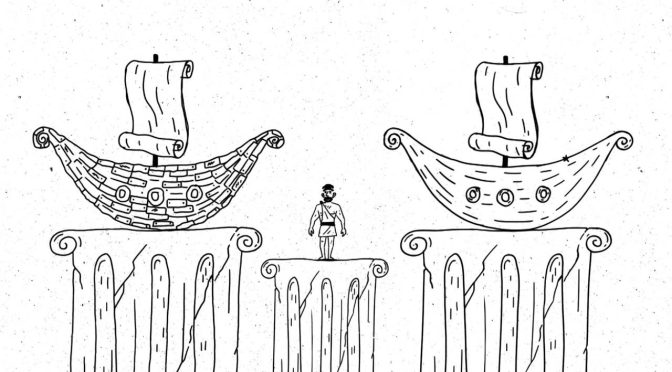This article is based on a video titled “Thought experiment «THESEUS»” by SRF Kultur Sternstunden. The video gets into the philosophical thought experiment known as the Ship of Theseus, which explores questions about identity and change. Through the lens of this ancient Greek narrative, the video raises profound questions about human existence, specifically focusing on how we maintain our identity despite constant change.
Contents
- The Passage of Time and Self-Reflection
- The Tale of Theseus and His Ship
- The Reconstructed Ship
- Us: Continual Change and Consistent Identity
- What Defines Our Identity?
- The video
- Thoughts
The Passage of Time and Self-Reflection
Every so often, when we glance at old photographs, we’re confronted with the passage of time and the inevitable question: despite the evident changes, am I still the same person I once was? This introspection (often accompanied by a sense of nostalgia) leads us to ponder the nature of our identity amidst constant change.
The Tale of Theseus and His Ship
The narrative takes us to ancient Greece, introducing us to the legendary Theseus, famed for his adventurous sea voyages. Over time, the wear and tear from his expeditions necessitate frequent repairs to his ship. As parts wear out, they are replaced, and as the years roll on, every component of the ship gets substituted with new materials. This leads to a perplexing question: if every part of the ship has been replaced, is it still the same ship? This dilemma (often referred to as the Ship of Theseus paradox) challenges our understanding of identity and continuity.
The Reconstructed Ship
In a fascinating twist, the video presents a scenario where the shipmaster, after replacing all the parts of the original ship, decides to reassemble the discarded old parts into a new ship. This act raises another set of questions: Do we now have two ships of Theseus? Which one is genuine – the newly constructed one or the one built from old parts? Or are both authentic, or perhaps neither?
Us: Continual Change and Consistent Identity
Drawing a parallel to human existence, the video highlights that, much like the ship, humans undergo constant change. Within a span of seven years, our cells renew themselves entirely. Our beliefs, values, and aspirations evolve as well (for instance, childhood dreams of becoming an astronaut might transform into adult realities of desk jobs). Yet, amidst these shifts, we believe we remain the same individual. This belief prompts us to reflect on what truly constitutes our identity and why, despite incessant changes, we feel a sense of continuity in who we are.
What Defines Our Identity?
The crux of the video, and indeed the thought experiment, revolves around the enigma of identity. What anchors our sense of self when everything about us, be it physical or mental, is in a state of flux? This question, while not providing definitive answers, encourages viewers to engage in profound self-reflection and to contemplate the deeper aspects of existence.
The video
Thoughts
The Ship of Theseus thought experiment, which serves as the focal point of the article, presents a compelling paradox that challenges our understanding of identity in the face of continual change. This paradox, when applied to human existence, becomes even more compelling because unlike a ship, which is an inanimate object, humans possess consciousness, emotions, and a sense of self (a complexity that adds layers to the question of identity). The ship, after all its parts have been replaced, might be considered the same by some and different by others, but it does not have the ability to ponder its own existence.
In the realm of biology, the human body undergoes a similar process of renewal, with cells regenerating approximately every seven years. This biological fact raises a question parallel to the Ship of Theseus: if all our cells are replaced over time, do we remain the same individual? The biological transformation is not merely a superficial alteration; it’s a complete overhaul of the cellular structure that constitutes our physical being (yet, paradoxically, we don’t experience a ‘reset’ of our identity every seven years).
The philosophical implications of this cellular renewal are profound. While the Ship of Theseus focuses on the material aspects, the human condition adds layers of complexity through consciousness, memories, and experiences. These intangible elements, which are not subject to cellular regeneration, contribute to our sense of continuous identity (and perhaps, it’s this continuity of consciousness that convinces us of our unchanging self).
The Ship of Theseus thought experiment and the biological fact of cellular renewal both serve as intriguing entry points into the labyrinthine discussions about identity. They force us to confront and question the stability of ‘self’ in a world where change is the only constant (a world that, ironically, both demands and resists change). While the ship may not ponder its identity, we have the cognitive ability—and perhaps the existential responsibility—to question ours.

